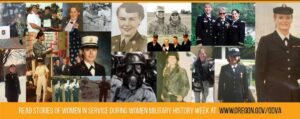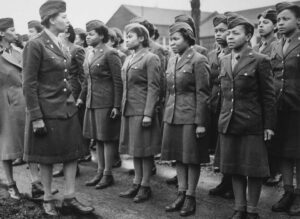![]()
Story by Tyler Francke, ODVA Communications
Seventy-five years ago today, more than 160,000 Allied troops stormed the beaches of Normandy to fight Nazi Germany.
Spurred on by Gen. Dwight D. Eisenhower’s words that “we will accept nothing less than full victory,” more than 5,000 ships and 13,000 aircraft supported the D-Day invasion, and by day’s end, the Allies had gained a small foot-hold on the continent of Europe.

U.S. troops wading through water and Nazi gunfire on D-Day.
The June 6, 1944, assault included what was, at that time, the largest use of airborne troops in military history. The 17,000 paratroopers, glider infantry and support troops were assigned what might have been the most daring and difficult task of the D-Day operation: a night jump behind enemy lines, five hours ahead of the coastal landings.

Bill Wingett, today a resident of the Oregon Veterans’ Home in Lebanon, was one of those brave paratroopers who jumped into the inky blackness on D-Day, with only a vague understanding of what lay below.
Wingett was part of E Company of the 101st Airborne Division’s 506th Parachute Infantry Regiment during World War II. Better known as “Easy Company,” it has become one of the most famous units in American history, thanks to the 2001 HBO miniseries Band of Brothers and the popular book by Stephen Ambrose that it was based on.
But Wingett, one of its original members, almost missed the war altogether.
He enlisted on Dec. 8, 1941, the day after Pearl Harbor. But the next day, while waiting to be called for duty, he was involved in a horrific car accident that left him hospitalized for four months.
“I was right in the middle of the turn, and wham,” he recalled.
He was promptly discharged from military service, and he went back to his former job as an apprentice carpenter. Of course, the itch to serve was still there, and on Aug. 19, 1942, he drove back to that same San Francisco recruiting office and joined the Army.
“I was right in the middle of the turn, and wham,” he recalled.
“I never talked about the accident, and I passed the physical fine,” he said.
Wingett signed on with the Airborne for one very simple reason.
“They would pay you an extra $50 a day until training was over,” he said.
He went through training with Easy Company at Camp Toccoa, Georgia, and later, near Aldbourne, England, and forged deep friendships with his platoon mates. But, just days before Wingett was to parachute into Normandy, he received some unexpected and unwelcome news.
He was being transferred, to the 506th’s Headquarters Company — the result of a feud with a sergeant he maintains “had an ax to grind” against him.
Nevertheless, Wingett made his jump, and his efforts — along with those of his fellow airborne troops — helped accomplish their primary goals of keeping the German army occupied and securing the left flank of the invasion force.
It’s not something he likes to talk about, even now, 75 years later.
“Why should I talk about the war?” he asked. “The war was a generally unpleasant situation. I was shooting at people, and being shot at by people, and we had no knowledge of each other. It seemed like a terrible waste. Every place you turned, stuff was being wasted.”
Wingett, a machine gunner, stayed with the 506th as they fought their way through France, Holland, in the Battle of the Bulge in Belgium and into Germany, until the war ended in May 1945. He was decorated with medals for his service, including the Bronze Star for heroism and three Purple Hearts for wounds in Normandy, for a broken leg in Holland and for frozen feet in Bastogne.
That doesn’t make him a hero — according to him, anyway.
“It was not my aim to be a hero, or to be known as a hero,” he said. “I would just like to be known as Bill Wingett, the guy that was there when they needed him, the guy that did the best he could in the worst of situations. What more can you do?”
He was honorably discharged Nov. 23, 1945, but he later re-enlisted for three years with the 82nd Airborne Division. In 1964, he put on a different uniform, joining the U.S. Naval Reserve. He would retire 17 years later as a petty officer 1st class. He was also a longtime member of the Salem chapter of the Seabees.
“It was not my aim to be a hero, or to be known as a hero.”
“I’ve been in the military ever since the war,” Wingett said. “I don’t think of it as being anything special. I was in the military, and I was determined to give it all I had to give it, same as my dad did. Same as my brothers did.”
Wingett’s father had served in World War I, while his four brothers fought alongside him in WWII.
“When we came home, my brothers and I never sat down to talk about the war,” he said. “My dad and I never sat down to talk war. We just moved on.”
For two decades after the war, he worked in the lumber industry in California. In 1961, he moved with his wife and family to Salem, where he worked at a large paper mill before opening his own woodworking shop, which he continued to operate until his early 90s.
Now 96, Wingett leads an active life — physically and mentally.
“I’ve still got a lot to learn,” he said, “and by God, I’m going to be around to learn it.”
Views: 186


